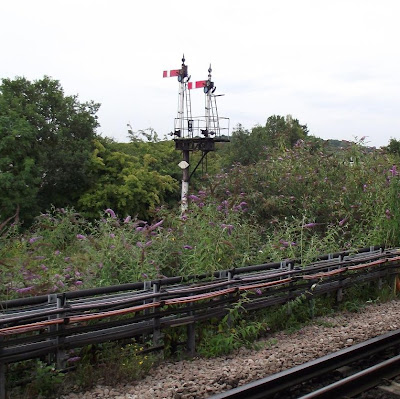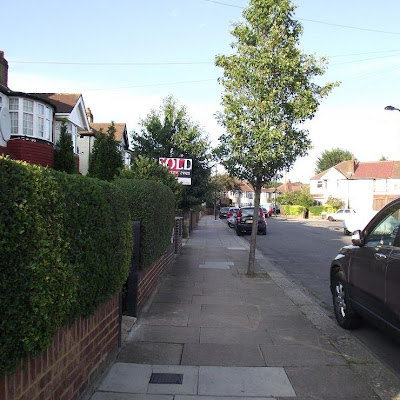
It is hard to believe that this screen of ubiquitous buddleia, scenting the suburban air, hides a railway line that has triggered intense debate, caused thousands of people to protest, and made a minister of state into a figure of hate. It is often referred to as “the Chiltern Line” and if the government has its way it will be the route for HS2, a high speed rail link connecting London to Birmingham and reducing the time of the present journey by about thirty minutes. What could you do with thirty minutes? Start the clock.

Spend your thirty minutes trying to complete a public consultation document, bearing in mind that it has been drawn up by someone who wants you to fall into a trap, to make you say that you actually do want a train charging past your home at over 200 miles an hour, that you have no objection to years of construction work, that you believe every word they say about noise levels. You left school to get away from this kind of thing and here you are taking an exam to stop your home becoming worthless, to justify the years, decades of work you put into paying a mortgage. You take advice, watch videos, listen to the experts before you answer “no” to everything, in a desperate attempt to save all that effort and sacrifice.

Think of all those minutes and half hours spent in a job you hate, gritting your teeth to get through one more day, hour, minute without flinging your letter of resignation at the boss, all for nothing because you are a nimby, small fry, nothing to a man whose salary you pay but didn’t vote for. Another nameless face in the crowd at a demo, along with all the other unwanted little people who have cluttered up his day, getting in the way of “progress”.
You will never be one of those gaining that extra half hour on a train moving so fast that the rest of mankind becomes a blur. You will never afford those plush seats and wonderful service. You will wait with all the rest on a station platform waiting for a worn out train that has been held up, again. Because there is no money to improve what already exists, what you can afford. You will sit in your car, on a bus, in a jam caused by the years of construction work that you are paying for to build a railway line you don’t want, can’t afford, don’t need. You will grind your teeth and curse those who inflicted this upon you and your lowly kind and know that you are helpless. You don’t count, your kind never have.

Thirty minutes in a bluebell wood, deafened by birdsong yet wishing you could make less noise as you walk amongst trees that were old when you were a child. A thousand cobwebs and caterpillar threads cling to your arms as they must have done to those of your ancestors when places like this were vast and untouched. You are the first to walk here today, in a place that has never changed and you thought never would until the minister expressed his opinion. Knowing that you are barely a heart beat in the time it took to make this place that cannot be replaced, replicated, remade. Thirty minutes, a pin prick in time in this woodland set like sapphires and emeralds amongst the coral of suburban rooftops, one last place to remember what it must have been like in this land before “progress” came and ate away at your soul. Time counts for nothing here.

Half an hour at an estate agent’s office, listening to all the advice he can give you on how to sell a worthless house. Paint the walls a neutral colour, thank God you redecorated some of it last year, it will take less money, less time. You’ll get the downstairs lav done in thirty minutes. Put the “For Sale” sign up and hope to hell that the neighbours don’t put one of those bloody posters in the window, hope that whoever takes the bait doesn’t check up on what that means. Keep your fingers crossed for a lot longer than thirty minutes, through every rare viewing, trying not to wince when “it” gets mentioned until you realise that they were just curious, not serious, bad luck. Wish that the things that once made your home such a bargain (“Five minutes walk from the nearest station!”) weren’t the things that make it so undesirable now.
The worst half hour is the one spent listening to your tearful elderly neighbour, born in her house, the one she hoped to die in. Listening to the despair of a woman who cannot fill in a form at the best of times and is rendered incoherent at the thought that her childhood home might be demolished, just another of the worthless small fry who will be swept away for the greater good. She loves her garden but even that has made her a target for the mockery of businessmen. She doesn’t own a bowler hat and her lawn is tiny, a postage stamp of green, but she knows each lily and rose, remembers the ones her mother planted and loves them still. It has taken many a half hour to make this patch of heaven and it was worth every moment.

Wonder, sometimes, how long it would take, how many pills, how much booze, to take the problem away forever. How many of those affected regularly spend thirty minutes that close to edge, when the worry becomes too much - “Why are you crying Mummy?” - when there is no fight left and despair takes over. When you begin to think that all the effort is pointless, that all those half hours have been wasted and you are worn away to nothing, for nothing. Knowing that, when the dust that can never settle makes its way, every day, into your home, your precious half hour will be frittered away by a business man, distracted by the many pleasures in that brand new temple to retail - the station - rushing off half an hour late in a wasteful carbon heavy cab to the appointment he might have made, had he been more mindful of those thirty minutes.
Stop HS2 - advice on completing the consultation document
Stop HS2 natonal petition



























 A
A



















